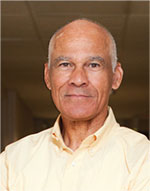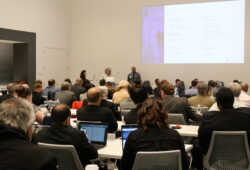HealthTrust members focus on community engagement through supplier diversity
Today, a growing number of hospitals and healthcare providers recognize the importance of embracing diversity in every aspect of the organization—including supply chain. A diverse supplier base better reflects a hospital’s patients and the communities it represents.
HealthTrust’s Supplier Diversity Program has been connecting its members with business enterprises owned by minorities, women and service-disabled veterans (MWSDVEs) for over 20 years. The program, with more than 75 diverse suppliers on contract with HealthTrust, is recognized as one of the most successful programs in the healthcare industry.

Minority- and women-owned businesses are defined as companies that are at least 51 percent owned by a woman or minority individual who also controls management and daily operations. There are approximately 7.8 million women-owned businesses, according to the National Women’s Business Council, and a 2014 survey commissioned by American Express OPEN found that about 1,200 new women-owned business enterprises start each day.
According to the Minority Business Development Agency, there are nearly 6 million minority-owned businesses. The U.S Census Bureau counts approximately 2.5 million veteran-owned businesses, with almost 8 percent owned by service-disabled veterans.*
HealthTrust’s diversity program gives potential suppliers the opportunity to enter the bidding process and compete for contracts with large healthcare organizations.
“Our members are really committed to their communities and diversity,” says Darrel Mogilles, assistant vice president of Strategic Sourcing and Supplier Diversity for HealthTrust. “We strive to make our supplier base reflect the patients our members serve.”

Having a diverse supplier base also promotes more competition among all vendors, adds Janet McCain, director of HealthTrust’s Supplier Diversity Program.
Giving Back to the Community
For many hospitals, diversity comes down to social responsibility.

“It’s the right thing to do,” says Andy Cox, senior director of Supply Chain Management at Methodist Le Bonheur Healthcare in Memphis, Tennessee. “Memphis, as a community, has several socioeconomic challenges. As a large organization in the community, we look at it as our responsibility to help MWSDVEs grow.”
A HealthTrust member since March 2013, Methodist Le Bonheur Healthcare has had its own thriving diversity program for several years, partnering with several local MWSDVEs.
HealthTrust’s Role in Promoting Supplier Diversity
The Supplier Diversity Program at HealthTrust has grown significantly over the last several years. There are more than 75 diverse suppliers on contract, and several more MWSDVE suppliers currently participate in various stages of the competitive bid process, says Darrel Mogilles, assistant vice president of Strategic Sourcing and Supplier Diversity for HealthTrust.
In the last seven years, the program has consistently grown more than 10 percent annually and, in 2014, HealthTrust members purchased a record $180.4 million from these suppliers.
HealthTrust’s diversity team now works more closely with contracting and clinical teams to integrate diversity into the work plan prior to the start of a project, says Janet McCain, director of the Supplier Diversity Program.
Recent improvements to the diversity program include:
> The Prospective Supplier Profile (PSP) has been revamped to better capture information and more accurately identify suppliers matching a current business need. The completed PSPs are automatically sent to the Supplier Diversity team, maximizing the number of diverse suppliers that have the opportunity to participate in the bidding process. This change has led to more diverse suppliers competing in an increasing number of contract categories.
> An educational symposium is held each year, giving contracted diverse suppliers the opportunity to learn more about HealthTrust processes.
> The HealthTrust team formalized a charter that provides guidelines for the inclusion of diverse suppliers in the contracting process. It better defines acceptable partnering arrangement between diverse and non-diverse suppliers.
> HealthTrust launched a subcontracting program, which McCain explains facilitates opportunities to pair a diverse supplier with a major vendor.
As part of their dedication to the community, Cox and his team work closely with the Mid-South Minority Business Council based in Memphis to identify local minority suppliers. Methodist Le Bonheur Healthcare also works with HealthTrust to maximize the participation of these local minority suppliers within the scope of their HealthTrust contracts, Cox says.
“We’ve developed so many relationships with local minority suppliers,” says Glenda Moore, director of Contract Management at Methodist Le Bonheur Healthcare. “We look for every opportunity to expand our portfolio, specifically with those suppliers that we’ve been doing business with over the years.”
And while cost savings is often a benefit, Cox says, the primary focus is on “engaging and bringing value to the local minority community. We feel socially responsible.”
A Community Connection
For Robert Wood Johnson University Hospital (RWJUH), supplier diversity is a pillar in the organization’s overall diversity initiative. Through its Center for Diversity and Inclusion, the New Brunswick, New Jersey, hospital works to ensure diversity is woven into the fabric of everything it does.

“We want to stay connected to our community, and formalizing diversity programs builds that bridge,” says Ryan Parker, chief diversity officer at RWJUH. “We want to show our commitment to diversity in every aspect of the health system and that includes contracting with minority- and women-owned businesses. It supports our mission to create strong and healthier communities.”
Through its partnership with HealthTrust, RWJUH is able to connect with several MWSDVE suppliers. Its own supplier diversity program won a HealthTrust Social Stewardship Award in 2013, just two years after its creation.

“We work closely with HealthTrust to identify minority suppliers,” says Anna Kuchinski, director of procurement and value analysis at RWJUH. “If there is a minority supplier available, we always like to make sure it is part of the bidding process.”
A Win-Win Situation
Partnering with diverse suppliers has other benefits as well. From cost savings to job creation, contracting with minority- and women-owned businesses proves to be a beneficial arrangement for both parties.
HealthTrust’s diversity program opens up the door for smaller companies that may not otherwise have access to the bidding process. But, as Kuchinski says, these smaller companies can often offer comparable products at more competitive prices.
Supporting diverse suppliers also creates more jobs and helps people become less reliant on free healthcare.
“Our hope is that contracting with diverse suppliers will aid in stimulating New Jersey’s economy,” Parker says.
“MWSDVEs provide jobs that can lead to more Americans with healthcare coverage, and this has an indirect financial impact on the cost of healthcare, our nation’s economy and hospitals’ bottom line. From a healthcare perspective, that’s important to us,” Parker adds.
And by establishing a business relationship with larger organizations, these minority- and women-owned businesses are able to expand their portfolio.
“It’s truly a win-win situation for everyone,” Moore says.
* New data exploring the growth of business enterprises owned by minorities, women and service-disabled veterans is expected to be released by the U.S. Census Bureau in December 2015.
Share Email Supplier Diversity





